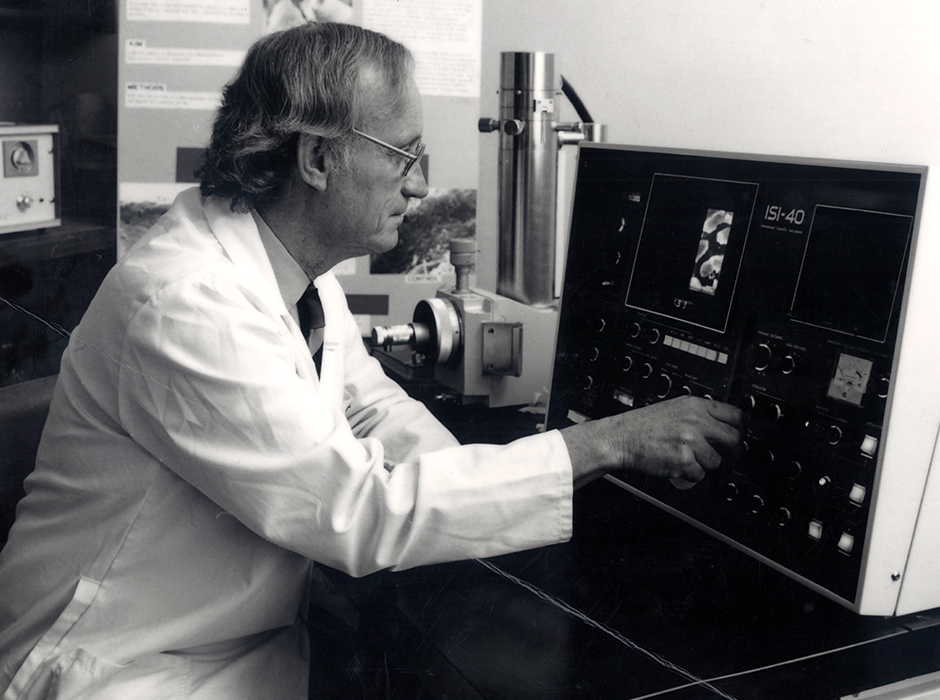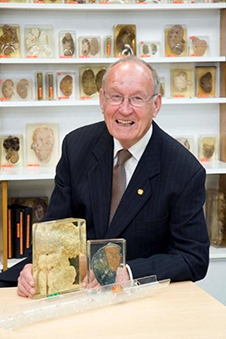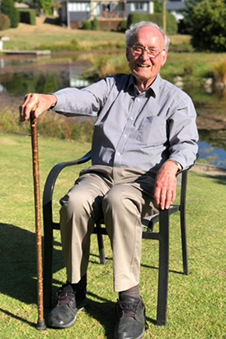
Emeritus Professor Robin Fraser pictured in his laboratory in the 70s, in the then Department of Pathology.
Emeritus Professor Robin Fraser ONZM, BSc (Med), MB BS, PhD, MD, FRACP was both an institution and a legend at the University of Otago, Christchurch, a clinical researcher and teacher of huge passion, kindness and regard whose legacy is profound - a man who embodied the line “hail fellow, well met”.
The anatomical pathologist began his career at the former Christchurch School of Medicine and Health Sciences at its genesis 50 years ago, influencing the careers of generations of medical students and researchers. His own research passion focussed on the “liver sieve” (co-discovered with Professor Eddie Wisse from Vrije University, Brussels), which he vehemently championed.
Born in Australia, Professor Fraser graduated with both Bachelor of Medicine and Bachelor of Science (Hons) at the University of Sydney, beginning his working career in 1961 as a country GP in Coonabarabran, rural NSW. The practice he joined was one of Australia’s very first group “bush” practices, a small team with an all-hands-on-deck mandate.
He remembered performing an “exchange transfusion” on a new-born rural baby with extreme jaundice and haemolysis, recalling how the local butcher saved the day, volunteering to be the RH negative blood donor due to the nearest base hospital being many miles away.
His early interest in medical research led him down the field of lipoprotein metabolism for his PhD at the Australian National University. He then undertook a post-doctoral position at the University of Chicago before returning as a Senior Lecturer at the University of Sydney.
His shift to Christchurch came in 1974, when he accepted an Associate Professor appointment in the then-named Department of Pathology at Otago University’s newly established Christchurch School of Medicine, alongside a Consultant Pathologist position at Christchurch Hospital.
Added to his anatomical pathology and coroner’s pathology work, he dedicated himself to teaching and research, expanding on his earlier interest in the metabolism of dietary lipids, fatty liver disease and liver cirrhosis, and diabetes.
At the hub of this research was the concept he pioneered, which he coined the “liver sieve”. Formed by specialised cells in the liver, the liver sieve is a microscopic filter that regulates entry of lipids and other substances into the liver. The discovery helps explain how our body controls the metabolism of food fats, including cholesterol.

Professor Fraser was known for his research on the functioning of the liver.
This work was truly innovative, leading Professor Fraser to author and co-author hundreds of published studies in esteemed medical journals, as well as national and international collaborations with research teams at some of the world’s noted universities.
His research team at Otago’s Christchurch campus were the first to test several important liver hypotheses, some of which are now accepted in clinical practice. They were the first to show that high doses of ethanol (dietary alcohol) over a long period of time leads to defenestration and lower porosity of the liver sieve and that nicotine alters the sieve by changing the size of the fenestrae. A further international collaboration found that hormones such as adrenaline and serotonin have a similar disruptive effect on the liver.
This work has led to renewed international research focus on the liver sieve and its role in the pathologies of ageing and autoimmune disease. His research interests in atherosclerosis and heart disease, alcoholism and cirrhosis, diet, vitamins, and disease have likewise translated to clinical applications in medicine and pathology.
Professor Fraser was equally revered in the field of medical teaching. Known for his kindness and generosity with students, he was a firm advocate of integrating research with clinical practice. He was honoured with many awards for his teaching prowess and passion, including the inaugural Patron of Christchurch Medical Students in 1996 – he named this one of his “most treasured honours”.
As then Head of the Department of Pathology, he took many medical students to observe his weekly coroner’s autopsies, as well as heading off-campus for teaching “field trips” to provide clinical support to clients struggling with alcohol-related disease from the probation service, Salvation Army Bridge Programme Odyssey House and Christchurch Men’s and Women’s prisons.
Former campus Dean and Professor Fraser’s successor as Head of Pathology, Professor David Murdoch, says Robin was a gifted and generous teacher, welcoming 4th year medical students to the Pathology programme.
“Robin would give the same talk each year, describing the discipline of pathology, from the universe way down to individual molecules, with the volume and enthusiasm of an evangelical preacher,” Professor Murdoch recalls.
“Robin also had the uncanny knack of linking any topic with the liver sieve – no matter how unlikely this might seem!
“At first, students wondered what had hit them, but then, as they got used to Robin’s style and humour, they engaged with his narrative, which would usually end with spontaneous applause.
“This was Robin in his element.”
Current Head of the Department of Pathology and Biomedical Science, Professor Martin Kennedy says Robin would avidly attend all research seminars at the medical school, and, just as avidly, ask at least one insightful question of the speaker.
“Remarkably, no matter the topic of the seminar, Robin always managed to bring the liver into the focus of the question,” Professor Kennedy also recalls.
“He was quite an institution in this regard, and will be very fondly remembered for these questions, and for his huge enthusiasm regarding the importance of medical research.”

Professor Fraser at his home in his later years.
He always made a beeline for the exact same spot in the Rolleston Theatre, which became known as “Robin’s seat”.
Professor Murdoch recalls: “His comments were priceless, incorporating humour, frequently from an unexpected angle, but always with insight.
“He made us laugh and he made us think.”
Appointed Associate Dean of Research in 1988, he was honoured with the title Emeritus Professor in 1999 and appointed to numerous research positions both here and in Australia. He was made an Honorary Life Member of the Canterbury Medical Research Foundation in 2003 and Honorary Medical Director in 2006. That same year he was made an Officer of the New Zealand Order of Merit (ONZM) for his services to medical research.
Professor Fraser officially retired in 2009 yet devoted countless hours speaking to service clubs, church and community groups about the latest advances in medical research.
In recognition of his huge legacy, the university introduced an annual Robin Fraser Research Supporter of the Year Award, inspired by his relentless enthusiasm and support for research and research staff.
A much-loved and devoted father of six, and grandad of 12, his widow Linda says he cherished his family life in retirement.
“His joy and love for his family was profound and he adored his children and grandchildren,” she says.
“His passion for his work with the liver sieve was a source of immense joy to him, and pride for us.”
Linda recalls his regular walks up and down Dyers Pass Road to fetch the Saturday loaf of bread were, for him, opportunities to connect with others.
“He had a real gift for engaging with people from all walks of life, striking up conversations that often left a lasting impression.”
Professor Fraser passed away peacefully last month at Ashwood Park Retirement Village in Blenheim, aged 91.
The University of Otago, Christchurch, has plans to hold a Memorial on campus to honour Professor Fraser in October, including the installation of a plaque marking “Robin’s Seat”.